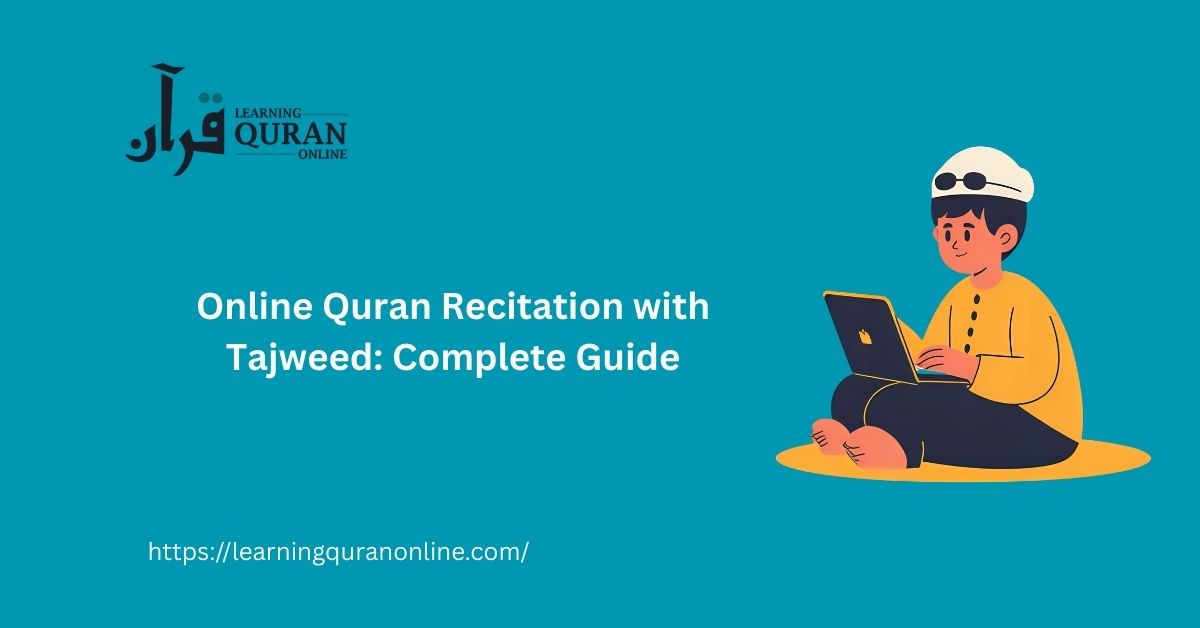Table of Contents
ToggleWhat Is Tajweed?
Tajweed (also spelled tajwid or tajweed rules) literally means “to make better” or “to improve.” In the context of Quran recitation, it refers to the set of rules governing correct pronunciation, articulation points (makhraj), attributes of letters (sifat), and rules of stopping, starting, and elongation (madd). Tajweed preserves the original sounds of the Arabic Quranic text and avoids mispronunciations that could change meanings.
Why Tajweed Is Important
Correct tajweed is vital for the following reasons:
- Protects the meaning of the Quran from distortion due to mispronunciation.
- Enhances the spiritual experience of recitation by producing the proper cadence and rhythm.
- Respects the prophetic tradition (Sunnah) of reciting the Quran accurately.
- Enables listeners to understand and reflect upon the verses when recited correctly.
Core Components of Tajweed
Tajweed is composed of several interrelated elements. Understanding each helps learners refine their recitation:
- Makhraj (Articulation Points): Where each Arabic letter is produced—from the throat to the lips.
- Sifat (Characteristics): The attributes of letters such as qalqalah (echoing), shaddah (doubling), and heaviness/lightness (tarqeeq/tahqeeq).
- Madd (Elongation): Rules of lengthening certain vowels and sounds.
- Rules of Noon and Meem: Noon Saakin and Meem Saakin rules include izhar, idgham, ikhfa, and iqlab.
- Waqf and Ibtida (Stopping & Starting): Proper pausing and resuming to ensure grammatical and semantic integrity.
- Pronunciation (Tarteel): Smooth, measured, and melodious recitation according to the recitation style (qira’at).
Common Tajweed Rules Explained
Beginners and intermediate reciters should focus on the following essential tajweed rules:
- Idgham: Merging letters when two specific letters meet (e.g., when noon saakin is followed by certain letters).
- Ikhfa: Concealing the sound between izhar and idgham for noon saakin rules, resulting in a nasal sound.
- Iqlab: Conversion of noon saakin into meem sound under certain conditions.
- Izhar: Clear pronunciation without nasalization when no merging applies.
- Qalqalah: A slight echo on certain letters when they appear in a resting position.
- Madd: Short and long madd (madd tabaie, madd far’i) and the differences between them.
- Ghunnah: Nasalization primarily associated with meem and noon when they are doubled or followed by specific letters.
Makhraj and Sifat: How to Produce True Quranic Sounds
Proper makhraj and sifat are foundational. Each Arabic letter has a specific point in the vocal tract where it is produced—deep in the throat, from the tongue, lips, or nasal area. Training with a qualified tutor helps you:
- Identify and feel the exact articulation point for each letter.
- Differentiate similar sounds (e.g., ص vs س, ت vs ط) that non-native speakers often confuse.
- Apply sifat to reflect the correct characteristics of letters, such as heaviness (tafkhim) and softness (tarqeeq).
Benefits of Online Quran Recitation with Tajweed
Online tajweed classes have surged in popularity due to convenience and effectiveness. Advantages include:
- Flexibility: Schedule lessons around work, school, and family commitments.
- Access to Native Tutors: Learn from qualified teachers and Quran reciters (qari) globally.
- Personalized One-on-One Lessons: Correct pronunciation quickly with instant feedback via video calls.
- Recorded Sessions: Review your lessons and audio corrections anytime to reinforce learning.
- Progress Tracking: Structured curricula, milestones, and tajweed certification options for motivation.
- Cost-Effective: Lower overheads often mean more affordable rates compared to local private tutors.
How Online Tajweed Classes Work
Online Quran recitation programs typically follow a step-by-step progression to ensure proper foundational training and measurable improvement:
- Assessment: A short evaluation determines your current recitation level and sets learning objectives.
- Structured Curriculum: Lessons cover Arabic letters, makhraj, sifat, tajweed rules, and practice with the Mushaf (Quran text).
- One-on-One or Small Group Lessons: Live sessions via video conferencing with screen sharing and digital Quran pages.
- Homework and Practice: Audio recordings, exercises in tajweed, and daily recitation tasks reinforce lessons.
- Feedback & Correction: Tutors provide real-time corrections and periodic recordings with pinpointed adjustments.
- Evaluation & Certification: Regular tests and certificates of completion for many reputable online Quran academies.
Choosing the Right Online Quran Academy or Tutor
Selecting the best online Quran tutor for tajweed requires careful consideration. Here are key factors:
- Qualifications: Look for certified tutors with classical tajweed training and Quran teaching experience.
- Native Arabic vs Non-Native: Native Arabic speakers can help with authentic pronunciation, but qualified non-native tutors can also be excellent teachers.
- Teaching Methodology: Check whether the academy uses structured lesson plans, interactive methods, and audio/video feedback.
- Reviews & Testimonials: Read student feedback and success stories to gauge teaching quality.
- Trial Lessons: A free or discounted trial class lets you evaluate teaching style, pace, and compatibility.
- Curriculum & Certification: Confirm whether the program offers a progressive curriculum, assessments, and recognized certification.
- Price & Scheduling: Compare packages, payment plans, and scheduling flexibility.
Note: At Learning Quran Online, we provide certified tutors, interactive tajweed sessions, and structured curricula to help students progress with proper recitation.
Practical Tips to Improve Quran Recitation Online
Whether you’re a beginner or refining advanced tajweed rules, apply these practical tips for faster progress:
- Practice daily for short, focused sessions (20–40 minutes) rather than occasional long sessions.
- Record your recitation and compare it to recordings of skilled qaris to catch pronunciation gaps.
- Master one tajweed rule at a time—solidify it in practice before adding new rules.
- Use transliteration only as a temporary aid; transition quickly to Arabic script.
- Work on breath control and stopping (waqf) to maintain rhythm and clarity.
- Learn basic Quranic Arabic terms to understand grammar and meanings, making tajweed application more meaningful.
- Request corrective feedback from your tutor and practice the exact corrections they highlight.
Resources for Online Tajweed Learners
Useful resources and tools can accelerate learning:
- Interactive Quran platforms with tajweed coloring and audio (Mushaf Tajweed).
- Quran recitation apps for iOS and Android with slow play and repeat features.
- YouTube and audio libraries of world-renowned qaris for imitation practice.
- Tajweed rule charts, downloadable PDFs, and flashcards to memorize rules.
- Online forums and study groups to practice with peers and exchange tips.
Certification and Long-Term Goals
Many online programs offer certificates for course completion, proficiency in tajweed, or ijazah-style certifications through qualified scholars. When choosing a course, decide your long-term goals:
- Memorization (Hifz) combined with tajweed for long-term retention and correct recitation.
- Ijazah or certification if you plan to teach or lead recitations officially.
- Continuous improvement and participation in recitation competitions or community prayers.
Conclusion
Learning Quran recitation with tajweed online is an effective and accessible path to mastering the divine words. With the right tutor, structured curriculum, and consistent practice, anyone can improve their articulation, melody, and understanding of the Quran. Whether you seek foundational tajweed skills, advanced recitation styles, or certification, online tajweed classes offer the flexibility and resources to reach your goals. Start with a proper assessment, commit to a regular practice routine, and use recorded feedback to refine your recitation step by step.
Frequently Asked Questions (Quick)
Is tajweed necessary to recite the Quran?
While basic recitation can be understood, tajweed is essential to preserve correct pronunciation, prevent meaning changes, and follow the prophetic tradition of reciting the Quran properly.
How long does it take to learn tajweed?
Time varies by learner dedication, frequency of practice, and prior Arabic knowledge. With consistent daily practice and weekly lessons, noticeable improvement can be achieved in a few months; mastery may take longer.
Can children learn tajweed online?
Yes, many online academies offer child-friendly curricula, gamified lessons, and patient tutors experienced in teaching young learners.
Do online classes provide certification?
Many reputable online Quran academies provide certificates of completion or tajweed proficiency; some arrange ijazah certificates through qualified scholars.
Ready to begin? Look for a trial lesson with a certified tajweed tutor, set clear goals, and commit to consistent practice. With the right guidance and resources, accurate Quran recitation becomes an attainable and rewarding spiritual skill.
















